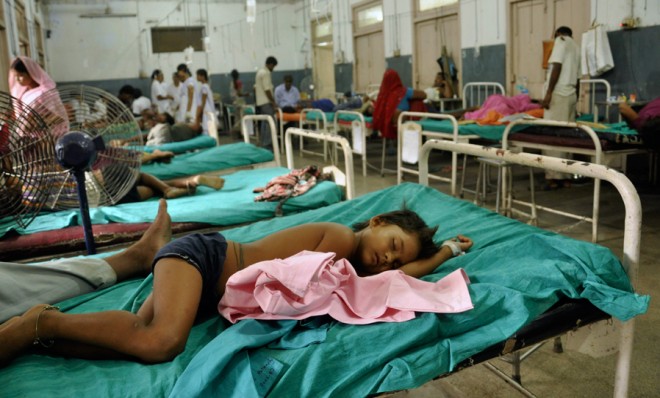The potentially dangerous fallout from India's school-lunch tragedy
At least 21 kids are dead and dozens more are sick after eating tainted free lunches


A free daily email with the biggest news stories of the day – and the best features from TheWeek.com
You are now subscribed
Your newsletter sign-up was successful
Rioting broke out Wednesday near a village in India where at least 21 children, all age 10 or younger, died after eating a free school lunch that doctors say appears to have been poisoned with insecticide. Another 30 children were hospitalized with severe vomiting and diarrhea after they ate the meal, which according to various reports included lentils, vegetables, rice, soybeans, and potatoes. A cook, who tasted the food after kids complained it tasted odd, also fell ill.
The outrage went global, with Oxfam tweeting that the tragedy was an indictment of "pathetic officialdom" in the impoverished state of Bihar, where the school is located.
The danger now, some observers say, is that the anger over the deaths could weaken support for a nationwide program that provides free mid-day meals to 120 million kids across India and has been hailed as a huge success.
The Week
Escape your echo chamber. Get the facts behind the news, plus analysis from multiple perspectives.

Sign up for The Week's Free Newsletters
From our morning news briefing to a weekly Good News Newsletter, get the best of The Week delivered directly to your inbox.
From our morning news briefing to a weekly Good News Newsletter, get the best of The Week delivered directly to your inbox.
India's Mid-Day Meal Scheme, which provides at least one meal per day to children of poor families, was made mandatory nationwide in 2001 under an order by the country's Supreme Court, which concluded that the program was necessary to reduce childhood malnutrition. Half of India's children are undernourished, and economists have credited the free lunches with boosting school attendance and reducing hunger. The program, which reaches students in 1.2 million schools, is the largest of its kind in the world.
But it has been criticized over hygiene problems and poor food quality. Last year, it was touched by scandal when 12- and 13-year-old brothers at a government school in Bihar were allegedly caned (until they fainted) by their headmaster because they refused to eat food in which they claimed to have found insects. The headmaster denied it, but the case received widespread attention.
The danger now is that the Bihar tragedy will weaken support for the program. Economists say it shouldn't, notes Soutik Biswas at BBC News. Still, he says, this heartbreaking case "proves India needs to tighten up its hygiene (children have fallen ill in Bihar and Goa and Delhi in the recent past after school meals) and improve safety at school kitchens (more than 80 children were killed in a school fire in Tamil Nadu in 2004) to make the Mid-Day Meal a program it can be truly proud of."
The source of the contamination in the latest incident still isn't clear. The doctors suspect pesticides, with a local official suggesting the food might not have been properly washed. A cook, however, says the school kitchen recently started using a new kind of cooking oil, which some locals theorize might have been contaminated. Poor kitchen hygiene — a problem in the school-lunch program in the past — could also be to blame.
A free daily email with the biggest news stories of the day – and the best features from TheWeek.com
Authorities have suspended an official who ran the school's meal program. Police are looking for the headmistress, who fled when the children began falling sick.
Harold Maass is a contributing editor at The Week. He has been writing for The Week since the 2001 debut of the U.S. print edition and served as editor of TheWeek.com when it launched in 2008. Harold started his career as a newspaper reporter in South Florida and Haiti. He has previously worked for a variety of news outlets, including The Miami Herald, ABC News and Fox News, and for several years wrote a daily roundup of financial news for The Week and Yahoo Finance.
-
 Film reviews: ‘Send Help’ and ‘Private Life’
Film reviews: ‘Send Help’ and ‘Private Life’Feature An office doormat is stranded alone with her awful boss and a frazzled therapist turns amateur murder investigator
-
 Movies to watch in February
Movies to watch in Februarythe week recommends Time travelers, multiverse hoppers and an Iraqi parable highlight this month’s offerings during the depths of winter
-
 ICE’s facial scanning is the tip of the surveillance iceberg
ICE’s facial scanning is the tip of the surveillance icebergIN THE SPOTLIGHT Federal troops are increasingly turning to high-tech tracking tools that push the boundaries of personal privacy
